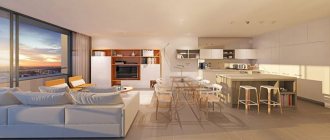Do apartments belong to the housing stock?
Apartments are non-residential premises, most often intended for commercial activities: hotels, hostels, hotels, sanatoriums. There is no clear wording in the laws, but in Art. 16 of the RF Housing Code lists the types of residential premises:
- A house or part of a house.
- Apartment or part of an apartment.
- Rooms.
Based on this, we can conclude that apartments do not belong to the housing stock. They are not intended for permanent residence, and permanent registration there cannot be obtained.
Will the apartments be converted into housing stock?
Back in 2021, there was talk about the possible transfer of apartments to residential premises, when it became clear that developers did not have enough space for residential development. The purpose of land plots for apartments is different: “for the placement of hotel-type buildings” or “for objects of public and business importance.”
The bill on transferring apartments to residential status was sent to the State Duma, but was criticized by the Supreme Court and it was withdrawn. In 2021, the question of the new status of the apartments began to be raised again, Rossiyskaya Gazeta wrote about it. According to Deputy Prime Minister M. Khusnullin, a bill clarifying the status of apartments could be adopted before the end of this year. As of October 2020 Such premises are currently classified as non-residential.
Registration of changes in Rosreestr
The final stage is registration of all changes in Rosreestr,
Simultaneously with registration, a decision on the new status of housing is also formalized, which is made by the Department. You can submit an application to Rosreestr in person or send it through the MFC. Specialists will make the necessary changes to existing records, after which the apartments will officially receive the status of residential real estate. There is no additional need to formalize ownership rights; this procedure is performed automatically; the corresponding document is issued to the owner upon completion of all actions within the framework of registration of the new status.
Apartment and apartment: differences
Now part of the primary real estate market is occupied by apartments. Developers sell them to people, promising to convert them into housing in the future. Converting non-residential premises to apartment status is beneficial for several reasons:
- Utility tariffs are becoming lower.
- You can apply for permanent registration.
- When purchasing a home, you can use maternity capital and other subsidies. For non-residential premises - no.
- Infrastructure. There are more kindergartens and schools in residential areas, and the infrastructure is constantly developing.
Let's look at the difference between apartments and apartments in detail:
| Conditions | Apartments | Apartment |
| Buying with a mortgage | You can buy commercial real estate with a mortgage, but the rates will be higher | Mortgages for residential premises are issued at lower rates, government subsidies are possible |
| Purchasing using government subsidies | Large families and other categories of citizens cannot use government subsidies for the purchase of non-residential premises | An apartment can be purchased with federal or regional capital, under any other government program |
| Maintenance of common property | The owners are allocated a share in the ownership of common property. Even if the owner does not use the elevator, stairs, or common areas, they will still have to pay for their maintenance | When purchasing housing in an apartment building, a share in the right to common property is allocated automatically. The owner can participate in general meetings |
| Home management | If most of the premises are purchased by a specific person, a majority owner appears. He has the right to deal with all issues: increase tariffs, transfer other premises for offices | The house is managed by an HOA or management company. Global issues cannot be resolved without a meeting of owners |
| Use of premises | Neighbors can use the apartment for any purpose: open a hotel, recording studio, office | Apartments are used for residential purposes only. It is impossible to conduct business in them, such as organizing offices or studios. Residential premises are subject to regional silence laws |
| Debt obligations of owners | If the owner has debts, by court decision the apartments may be seized to pay off the debt. Even if the owner says that this is his only home | The only housing cannot be collected for debts if it is not mortgaged |
| Receiving a tax deduction upon purchase | Not provided | You can return up to 520,000 rubles, and up to 390,000 rubles. mortgage interest for each spouse |
| Registration at place of residence | Only temporary registration is possible for up to 5 years. If the apartment is located in a business center and you cannot temporarily register there | Temporary or permanent registration possible |
| Registration of minors | Possible only with the consent of all owners over 18 years of age | A child under 14 years of age can be registered without the consent of the owner if the parent himself is registered at the apartment address |
| Utility tariffs | Much higher than for residential premises | They are regulated by the state and standards are set. Tariffs are lower than for apartments |
| Property taxes | Several times higher than for apartments and houses. The rate is equal to 0.5% of the cadastral value. If the apartments are located in an administrative building, the rate is equal to 2% | Owners pay 0.1% of the cadastral value of housing |
| Major renovation | Owners decide on major repairs themselves. There is no need to pay contributions for major repairs | Major repairs are carried out using contributions accumulated over several years. Money is paid monthly. |
Note: there are benefits to buying apartments. They usually cost 15-20% cheaper than apartments, and are located in the city center.
How to convert a garden house into a residential one?
Is it possible and how to convert commercial real estate into residential and vice versa?
Disadvantages of the status of “non-residential real estate”
But in a number of cases, shareholders have no idea that their housing will have the status of “non-residential”. When selling, the developer publishes completely correct information - housing is actually for sale, that is, you can live in the premises, and they were originally intended for this. However, there is no mention of status in advertising materials, and some buyers, not familiar with the intricacies of housing legislation, simply have no idea what awaits them. Namely:
- Utility tariffs are higher
than in residential real estate
(tariffs for commercial premises apply)
, that is, the owner will have to pay more. Current overpayments on utility bills over time offset the savings that resulted from lower housing costs; - It is not possible to register for housing on a permanent basis ;
it is possible to obtain temporary registration, however, the maximum validity period is 5 years, then you have to register everything again. Lack of registration complicates the ability to place a child in a kindergarten, school, register with a clinic, etc.; - Property taxes are calculated at the maximum rates used
for residential taxes. If the rate for an apartment is 0.1%, then apartments are taxed at a rate of 0.5% to 2%; - The buyer cannot count on a tax deduction ,
as is the case with ordinary apartments. - When constructing apartments, developers are not required to build social infrastructure facilities.
This means that, with a high probability, residents will have to put up with their absence.
Actually, apartments are an excellent option for those who intend to use housing of this format directly for its intended purpose, for periodic living. In this case, the owner is unlikely to be concerned about the impossibility of registration, and will not become poor when paying utility bills, since many items are calculated based on meter readings.
Can apartments be converted into residential premises during redevelopment?
Typically, developers immediately build apartments that meet the requirements for residential premises. If they do not meet these requirements, but the owners want to convert them to residential status, they can be redeveloped.
Redevelopment is done before submitting documents to re-register the status of non-residential premises into residential. First, you need to order a redevelopment project, approve it with the local administration (department of housing and communal services or city property) and obtain permission to carry out the work.
After redevelopment, you can submit an application to change the status of the property - from non-residential to residential.
If housing parameters can be “adjusted” to the new status
Now consider the following option:
the apartments do not comply with legal requirements, and redevelopment is required to change the status. To begin with, of course, you should clarify whether it is possible to carry out changes from a technical point of view, whether the authorities will issue permission for redevelopment, and whether the apartment, after completion of the work, will comply with all the required standards. To find out, you need to contact a public or private design organization.
If it turns out that redevelopment may well be carried out, you should prepare a draft of the proposed changes, and then go to the Department and apply for a permit. To the application you need to add a redevelopment project, a technical passport for the apartment (with a floor plan)
, these documents are drawn up in the BTI, DDU
(or other title document)
, as well as a passport.
After the commission inspects the property, the owner receives official permission and can begin work. If there is a refusal, it can be appealed in court. Upon completion of the work, you need to put the apartment into operation by contacting the same authority where the permit was issued.
When the redevelopment is legalized, you can submit an application to change the status of the property (to the same Department)
.
However, first you need to produce a new technical passport for the apartment (ordered from the BTI)
, which must be attached to the application along with the passport and title document.
Changing the status to residential premises when purchasing apartments in a new building
Some developers initially obtain permission to build apartments.
It is cheaper and has fewer requirements than for the construction of apartment buildings. The transfer of real estate to residential status is carried out during construction work; as a result, the shareholder under the DDU buys housing at a price below the market price, because The contract is for apartments, not for apartments. Converting apartments to apartment status is only a promise from the construction company. It is the apartments that appear in the DDU, and if the developer hands them over to the shareholder, it will be problematic to hold him accountable.
Lawyer's advice: if you want to live in an apartment, you should buy it, not an apartment. In the future, it will be almost impossible to prove that the developer promised to change the status to residential. You'll have to do this yourself. And it’s good if the premises meet the requirements for residential real estate. If not, you will have to do the redevelopment at your own expense.
The fourth story: a tribute to history.
Initially, the mansion on Prechistensky Lane, built in 1912 according to the design of the German architect Gustav Helrich, was a residential building. However, during Soviet times its status was changed. Vesper renovated the mansion a few years ago. The areas of the project, called “Gelrich House”, were sold as apartments, 10-15% lower than the cost of residential analogues. However, in 2013, by the time construction work was completed, the buyers approached the developer with a proposal to change the legal status of the property, and assumed the costs of converting it into housing. This operation took Vesper four months to complete. True, it was not possible to find out any details from the developer.
Requirements for residential premises
The transfer of apartments to an apartment is possible only if they meet the requirements for residential premises established by Decree of the Government of the Russian Federation of January 28, 2006 No. 47:
- Territorial location in a residential area determined in accordance with urban zoning.
- Resistance of load-bearing structures. Significant damage, tilting, and deformation are not allowed.
- Residential premises and common property must be arranged taking into account safety standards to prevent the risk of injury to people when moving in or around them.
- Availability of all engineering systems: water, electricity, heat supply. If the area is gasified, gas supply will be required. In the absence of any of the systems, the owner carries out everything at his own expense.
- Humidity in living rooms is no more than 60%.
- Protection against penetration of melt water, snow, groundwater into premises.
- If the building is higher than five floors, there must be an elevator.
- The presence of windows in one- and two-room apartments - in at least one room, in three-room apartments and more - in at least two rooms.
- Ceiling height – from 2.5 m.
- Availability of natural light in the kitchen and room.
- The permissible noise level is 55 dB during the day, 45 dB at night.
- Compliance with sanitary requirements in terms of the level of electromagnetic, ionizing radiation, radiation, concentration of harmful substances. It should not be exceeded.
Note: the possibility of transferring apartments to housing stock is established by an expert opinion from a specialized organization, which the owner has the right to apply to. It is also reflected in the inspection report and the conclusion of the interdepartmental commission: these documents are submitted to the administration to make a decision on the transfer of non-residential premises to residential ones.
Underwater rocks
Owners should pay attention to the following:
- Re-registration of apartments is possible only if several conditions are met. The property must belong to the citizen. The property must not have any encumbrances. The property must meet the established requirements for residential premises.
- Drawing up a claim often causes difficulties for citizens. The application must indicate the legislative norms that local government officials did not take into account, as well as justify your point of view. If difficulties arise at this stage, it is better to consult with lawyers.
- When apartments are purchased under the DDU, the developer may promise to convert them into housing stock on his own. Information about this must be specified in the agreement. He can convert the property into residential during the construction phase or after putting the property into operation.
How can an apartment be converted to residential status?
The procedure for converting apartments into housing consists of several stages:
- Conducting an examination in an independent organization.
- Preparation of documents.
- Submitting an application and documents for consideration to the interdepartmental commission.
- Inspection of real estate by a commission.
- Receiving a decision on transfer.
- Making changes to the status of an object in Rosreestr.
Let us consider in detail how to convert apartments into housing stock and what is needed for this.
Step 1: conducting an examination
It is not necessary to order an examination yourself, but it is better to do so to make sure that the translation is really possible. For an assessment, you need to contact a private organization that has a license for this type of activity. Based on the results, a conclusion will be given, which is submitted along with other documents.
Step 2: collecting documents
To contact the interdepartmental commission, the owner will need:
- statement;
- extract from the Unified State Register of Real Estate;
- cadastral and technical passports;
- floor plan of an apartment building.
Note! If redevelopment is carried out and common property is affected, written consent from the neighboring owners must be obtained before doing so.
Contents and sample application
There is no unified application form for transferring apartments to housing stock. It is usually issued by an interdepartmental commission.
What is indicated in the application:
- Where to send: name of local government body, full name. leader.
- From whom: Full name, address of the owner.
- Information about the apartment: address, number of rooms, floor, entrance.
- Description of submitted documents.
- Consent of the remaining owners to change the status (if there is more than one owner).
- Date of compilation and signature.
Step 3: Submitting documents for consideration
Documents are submitted to the administration or housing department. Each region has its own organizations authorized to consider such applications.
Step 4: Conduct an assessment
Taking into account the procedure for recognizing the premises as residential, the commission verifies the compliance of the apartments with the established requirements. The technical condition, degree of fire resistance, and other factors are checked. If necessary, additional examinations and tests may be prescribed.
Based on the results, the commission draws up an inspection report, on the basis of which a conclusion is drawn up and a decision is made to transfer the non-residential premises to residential ones.
Note: the commission may include employees of the Ministry of Emergency Situations, Rospotrebnadzor, the housing department and other departments.
Sample act
Sample conclusion
Step 5: Get the solution
The final decision is made by the commission usually within 45 calendar days. This time is allocated for reviewing documents and conducting an examination. But there may be another deadline: each region has its own.
Step 6: registration of changes in Rosreestr
After making a decision, the administration itself will send documents to make changes to the status of the object in Rosreestr. But the owner has the right to apply for this independently by submitting an application directly or through the MFC. The procedure takes about 15 days.
If the housing parameters correspond to the new status
You need to go to the body that deals with issues of changing status (in the capital this is the City Property Department)
with an application and a set of documents.
The set includes an extract from the Unified State Register of Real Estate (confirming ownership)
, a copy of the passport, and a technical passport of the apartment from the BTI
(confirming compliance with the requirements)
. The latter document may not be provided; in this case, department employees will send the request themselves, but because of this, it may take more time to consider the application. Yes - you still have to pay a fee, the amount is about 20 thousand rubles.
After inspection of the housing by employees of the commission sent by the Department, a decision will be made to change the status of housing
or refusal
with a clear justification of the reasons.
If the reasons include such inconsistencies that can be eliminated by redevelopment, it is worth doing just that (the procedure is described below)
.
What to do if you are refused to transfer the apartments to residential premises?
The administration may refuse to change the status of the premises. The refusal must be motivated and set out in a written conclusion, which is handed over to the owner.
If you refuse, you have several options:
- Correct the reasons why the transfer of the apartments to residential premises was refused and submit the documents again.
- Appeal the refusal in court by filing an administrative claim.
In the latter case, the court may satisfy the claims, and then the administration’s decision to refuse will be canceled. It may be necessary to re-assess the premises' compliance with all requirements, and based on the results a new decision will be issued.
Advantages of the apartments
Apartments, despite their status, continue to be popular, and some buyers specifically choose this particular housing format. Mainly because apartments are cheaper than apartments (other things being equal)
. The cost reduction can reach 20% and is explained by the fact that such housing is not subject to general legislative rules that relate to housing parameters, as well as the organization of the local area.
Such residential complexes have many useful services - you don’t have to go far for household services. Often such houses offer cleaning, grocery delivery, and a laundry service; in addition, such projects, as a rule, are built in convenient areas with high-quality and established social infrastructure.
Arbitrage practice
There are not too many court cases challenging refusals to convert apartments into residential premises. But they are considered by analogy with other cases of converting non-residential properties into residential ones: the same standards are used everywhere.
Here are some examples of decisions on real cases:
- Appeal of the administration’s refusal to transfer non-residential premises to residential premises, refusal to make changes to the Unified State Register of Real Estate (Decision No. 2-2873/16 2A-2873/2016 2A-2873/2016~M-2603/2016 M-2603/2016 dated June 22, 2016 . in case No. 2A-2873/2016). The claims were denied.
- Recognition of the premises as a residential apartment, imposing the obligation to make changes to the registration certificate and the Unified State Register of Real Estate (Decision No. 2-3169/2013 2-61/2014 2-61/2014(2-3169/2013;)~M-2597/2013 M-2597/2013 dated February 12, 2014 in case No. 2-3169/2013). The demands were denied.
- On recognition of non-residential buildings as residential (Decision No. 2-261/2016 2-261/2016~M-161/2016 M-161/2016 dated April 19, 2021 in case No. 2-261/2016). Satisfaction denied.
Legal advice: before going to court, it is recommended to carefully study the conclusion and the reasons why the apartment was refused recognition as residential premises. Often, courts refuse to satisfy claims because people do not want to understand the details and reasons for refusals.
Reasons for refusal
Administration representatives may make a negative decision on the application. To do this, a written response is drawn up, which indicates the reasons for the refusal. This is usually due to the lack of necessary documentation or the premises not meeting certain requirements that apply to residential properties.
Under these conditions, you can do the following:
- collecting the necessary documentation;
- making changes to the structure of real estate;
- filing a claim in court to appeal a negative decision.
If the court satisfies the demands of the claim, then the refusal drawn up by the administration is canceled. Sometimes after this a re-evaluation of the property is carried out, after which permission is issued to transfer the property to housing stock. This document acts as title documentation, on the basis of which adjustments are made to the Unified State Register of Real Estate.
Lawyer's answers to private questions
How much does it cost to convert an apartment into a residential building if you do not do it yourself, but entrust everything to a lawyer in terms of paperwork?
It all depends on the region where the property is located. In large cities, such a service costs from 70,000 rubles, in small cities – about 50,000 rubles.
When should the developer convert apartments into residential housing if they are purchased under the DDU?
This is usually done before the house is put into operation, but can be carried out after. The terms are determined by agreement with the developer.
I am currently in the process of converting apartments into housing stock. I bought real estate before marriage. If she is transferred, will everything be divided in case of divorce?
No. According to Art. 36 of the RF IC, property acquired by a spouse before marriage is only his property and is not subject to division. Changing the status of a property during marriage does not play a role. But if redevelopment or reconstruction is carried out, and as a result, the cost of housing increases significantly at the expense of general funds, on the basis of Art. 37 of the RF IC, the court may recognize such property as common property and divide it.
Can apartments be provided under a social tenancy agreement?
No. According to Art. 49 of the Housing Code of the Russian Federation, under a social tenancy agreement only residential premises belonging to a municipal or state fund are provided.
I bought apartments under the DDU in my name. It has already been commissioned, the developer recently transferred all the premises to the status of apartments, the transfer deed has not yet been signed, I have not accepted anything. Can I register ownership of my wife?
Yes. But to do this, you will have to draw up an agreement for the assignment of the right of claim, or accept the apartment and then give it to your spouse under a gift agreement.
Where to start: the legal side of the issue
The first step is to put the legal side of the issue in order. Namely:
- Obtain ownership of housing if
we are talking about an apartment in a new building and this has not yet been done.
To do this, the new building must be put into operation (this is done by the developer)
, and the apartment must be transferred to the shareholder according to the acceptance certificate.
All that needs to be done in this case is to submit an application to Rosreestr along with some documents (copy of the DDU, passport, acceptance certificate)
and pay a fee
(about 300 rubles)
. You can take the package in person or send it through the MFC.
In fact, developers also offer the service of registering property rights,
however, they ask for an amount of 30 thousand rubles for its provision
(for mysterious reasons, never established by the Novostroev.ru portal, this is much higher than the official fee of 300 rubles)
. This is much more expensive than registering it yourself, so we cannot recommend this method of obtaining title.
- Remove encumbrances. One of these is the mortgage debt to the bank, which must be repaid.









